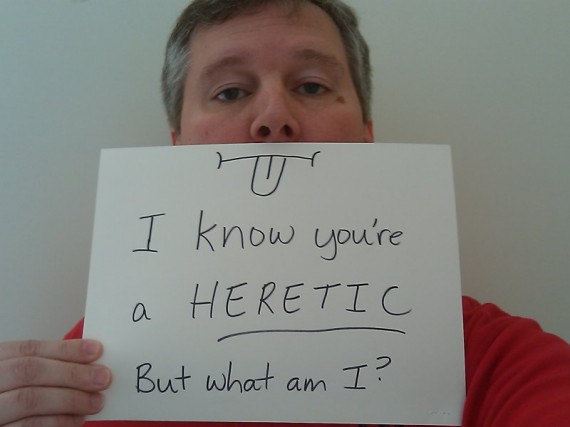
Yesterday we looked at several passages in Scripture that talk about “heresy” and we saw that heresy does not exist–at least, not the way we think of it today. I argued that according to Scripture, there is no such a thing as “heretical teaching” in the way the idea is used in churches today. Calling something “heresy” is a bogeyman tactic used to scare and control others.
We looked at a few passages that mention “heresy” in which we saw that biblical heresy is actually the division and separation that sometimes occurs within the Body of Christ. Heresy is not false teaching, but the destruction of unity within the Church.
The primary passage in Scripture which seems to challenge this view is 2 Peter 2:1.
Heresy in 2 Peter 2:1
Second Peter 2:1 is the closest we come to a designation of “heresy” as a doctrine or teaching condemned by God with the consequence that those who believe it are condemned to eternal damnation. In this text, Peter equates false prophets and false teachers with the destructive heresies they bring and writes that just as their teachings bring destruction to the church, so they themselves will face destruction.
But in light of what we have seen of the other uses of the word airesis in Scripture, it is best to see first if that meaning fits here, and if so, we should seek no other meaning.
And indeed, the idea of airesis as a division fits quite well. The “destructive heresies” that the false teachers bring could just as well be translated “destructive divisions.” And false teachings do bring division and splits to the Body of Christ and the fellowship of believers. Peter says that as a consequence of the havoc they wreak on a Christian body of believers will be returned onto their own body. Whether this is hell or not is a question for another day.

Heresy is Divsion
The point is that here in 2 Peter 2:1, the word airesis is consistent with the rest of Scripture. A heresy is not a false teaching itself, but the division that false teachings cause. The distinction is small, but there is a distinction.
A heresy, therefore, is not a false teaching, but is a division, a sect, a faction, or a group within the Body of Christ, which separates from the rest.
What About Heretics?
If this is true of heresy, then what about heretics?
This word comes from the Greek airetikos, which is used only one time in the entire New Testament, in Titus 3:10. And similarly to what we have seen about heresy, the problem is not the bad theology the person is teaching (though that is a problem), but rather the divisive and factious attitude of the person that Paul is most concerned about.
Dealing with Heresy Today
If we were going to be consistent today in our usage of the words “heretic” and “heresy,” we must not direct them toward people who have different theology than we, but rather toward those who want to argue, divide, separate, and split the church into various factions, denominations, and churches. And there is no shortage of these in religious circles today, except that they are usually not the ones we consider to be “heretics.”
So can we disagree with the theology of others, and do our best to point out to people where they are wrong? Of course we can! And we should! Jesus, Paul, Peter, and John all disagreed with others, sometimes very strongly. I will write about all of this in later posts.
But when we disagree, we cannot take a cheap shot and label others “heretics.” This is not how the Bible uses the term, and in fact, since condemning others as “heretics” is divisive, this behavior itself is the true biblical “heresy.”




We would probably do best to avoid calling anyone “heretic”, since almost everyone understands that term to mean a person who is teaching false doctrine/theology, rather than the Biblical sense of someone who is causing divisions within the body of Christ. It is usually used as a “Christian” form of name-calling in reference to those who disagree with us theologically.
I agree. It is a term that is widely abused and misunderstood. It is very pejorative today.
What do you think about the word “divisive”?
The word divisive works for me. I’ve been thinking about the people I know who understand many theological/Biblical issues very differently and yet get along very well as loving brothers who level no accusations against each other. Then I think of those who for primarily personal reasons (that would be a very long list to enumerate) seem to look for almost anything whereby they can accuse their brothers and create division.
Does someone simply understand differently, or are they trying to use their idea to create division? Sometimes it takes awhile to figure this out, but almost always the one trying to cause division is the one who first levels the charge of “heresy” against the other, often accompanied by anger and name calling. To confuse the matter, they often accuse the person with the understanding/interpretation that differs from theirs of being the one who is causing division.
Yep. That about says it.
For some, I think it is fear – but most of these may throw a few lobs then retreat.
I think the ones who get off on the power of ‘being right’ and have a desire to lord over others that are the primary dividers…and if they are in the pulpit, the teach division as desirable. Sigh.
Katherine,
Yes! I have been part of groups in the past who taught that the smaller their group was, the better, because it indicated that they were more “pure” and “doctrinally sound.”
Sam,
That is a great clarification. It is okay to disagree with others – even strongly disagree – but as soon as we start condemning others, and calling others names, we have crossed over from disagreement to divisiveness.
My only problem with this is that sometimes Jesus, Paul, Peter, and John used some pretty strong “names” to criticize those with whom they disagreed.
What do you think about this?
That is a very good answer, and currently, I think I would answer similarly.
That question gets us into the question of whether or not the Apostles (Paul did claim to be one also, if I remember correctly) had abilities and I suppose you would say “authority” or “rights” that ended when they died. So the question would be if they called certain people names, does that give us the right to do so?
Since I am not one of them and nothing I have written has been acclaimed as Holy Scripture, I think I’m on very shaky ground to condemn other believers and call them names, thereby causing division, and say that I am following in the footsteps of the apostles and/or Jesus.
Hi Jeremy, I received a fresh new insight on my morning walk today and I would like to share it here as a response to your “Jesus, Paul, Peter, and John used some pretty strong “names” to criticize those with whom they disagreed”. Maybe it will answer this question.
I have been pondering the dichotomy that exists around understanding the Bible and the following came to me. Here in the western world, we were / are raised and “cultured” in the Roman or Latin way of thinking and learning. Our (western version) Bible translations, reading and understanding is also based in that rigid, literal, ‘this is how it is’ Roman mindset. The Romans are known for their amazing and enduring architecture that was dependent on precise and literal measurements and values. It was also Romans who translated our Bibles and who taught us how the Bible was to be read and understood (it was not optional to be of a different understanding, or you’d be faced with the office of inquisition). And we have this “roman” way of thinking to this day.
On the other hand we have the Greeks, known for their love of wisdom… Philo-Sophia… and their approach is more of an esoteric or mystic approach to the writings. They like to consider the text and find it’s deeper meaning. Maybe a little more on the Gnostic side. And then there is the whole culture of the eastern world, and eastern orthodoxy and their very different version of the Bible.
The Romans despised the philosophy of the Greeks; there has always been a war about something and the outcome is simply that one party didn’t like the way the other party thought about things and ended up calling it heresy, or satanic, etc. etc.
We see some of this sentiment in the epistles of Paul being a Roman, where he mentions something about the Greeks as slow bellies. I believe that may be one of the passages in scripture that was merely “his opinion” and not actually inspired by God. God is not encumbered by the sentiments we human beings carry around, and they have no place in His redemption for mankind.
I wonder how much of our disagreement with one another can be attributed to these different mindsets and our inability to understand other cultures and their way of thinking?
Is it possible that a Roman and a Greek person would end up with different translations and choice of expression based on their culture at all?
For instance, the word “heretic” for us today clearly has the nuanced definition as implied during the Roman dominated “dark ages” – a culture of hunting and killing the heretics.
How much of that “roman” sentiment and thinking has influenced the translation of our Bible and in particular those passages that make Jesus, Paul and Peter speak in such harsh language?
When I am faced with questionable passages such as Jesus whipping the money changers out of the temple for example, I always go back to the “standard” of the image of God which is clearly outlined in 1.Cor 13 and Gal 5:22,23. If we see Jesus acting in a manner that conflicts with the “character of God” as outlined in those verses, and for some reason He looks and sounds a little bit too much like us… I question the translation and think that maybe a little bit of human bias made it’s way through the pen of the translator.
Good post! Sound argument. Of course there are “heterodidaskalei” false teachers who teach false doctrine. Paul pointed this out in 1 Timothy 6:3.
Thought I would leave the comment here as well.
Miquel,
Great catch! I had only looked up “pseudodidaskalos” and so missed the reference to “other teachers” there in 1 Timothy 6:3. It does seem to be a softer term than what Peter used, but the disagreement is still there.
very good text.
… can we conclude that the reformers were heretics?
… and every denomination founders who came after ?
Tommy,
Whew! What questions!
I think I am going to say, “No” simply because I don’t want to ever be accused of calling the Reformers heretics, or other denominational founders.
Were they divisive? Yes, I suppose some of them were.
But I am too (See my I Am Divisive post).
I guess where I’m coming from is that sometimes, separation is necessary, but somehow, we still need to work together with those we separate from? I’m still trying to practically work this out in real life…
Yes, good questions Tommy, and something I have been bearing in mind when reading this series.
I do think that we need to be firm on “sound doctrine”. There are many false teachings in the Church today, just as the false teachings and practices of Rome were rife at the time of Huss, Jerome and Luther. We do need to be on guard against such false teachings, and to call those who teach such to repent. The question then begs itself: would I be proud for saying my understanding is superior to another’s?
Yet if we are convinced that a church is teaching grave error what should we do? When I personally lost confidence in the methods and subsequently the doctrinal position of the leadership at my last church I was keen to leave, and as soon as a positive reason for so doing presented itself, I did move to another church. That was how I dealt with it then – today I might act differently.
No question that divisiveness and its bratty little brother, name-calling, are among the most shameful blights in the church, but my understanding of the root of the word translated “heresy” has to do with choosing or picking. I have understood that, accordingly, a heretic is one who focuses on a certain passage of scripture to the exclusion of all other passages dealing with the same subject. For an example, some take Peter’s instruction in Acts 2:38 as a prescription for the practice of water baptism ignoring other clear teaching that nothing we can do can save us and that baptism is simply an outward reflection of Christ’s saving work in our lives. It seems a small issue but when we look at all the false teachings that arise from it: salvation by works, baptism in the Holy Spirit requiring “sign” gifts, denying the trinity, whom is actually saved… It doesn’t take long until the foxes have spoiled the grapes entirely. Paul’s epistles spend many words attacking the teachings of these “pickers” many of whom meant well without understanding the destructive nature of their teaching.
To me, it seems overly simplistic to merely interpret “heresy” as divisiveness. There is no defense for being divisive of course but we never see Paul apologize for his “divisive” withstanding of Peter at the arrival of those commonly referred to as Judaizers. Further, divisiveness, false teaching, avarice, personal pride and ambition are all treated specifically. Since all of them must, apart from grace leading to repentance, lead to division eventually, it doesn’t seem to make sense to incorporate 2 significantly different meanings into the same word.
Not intending any contentiousness and it seems from your other posts you have no contention for its own sake as well.
So what do we call these persons who commit heresy ? People are performing these acts that create division. And doing for political gain in opposition to biblical teaching.